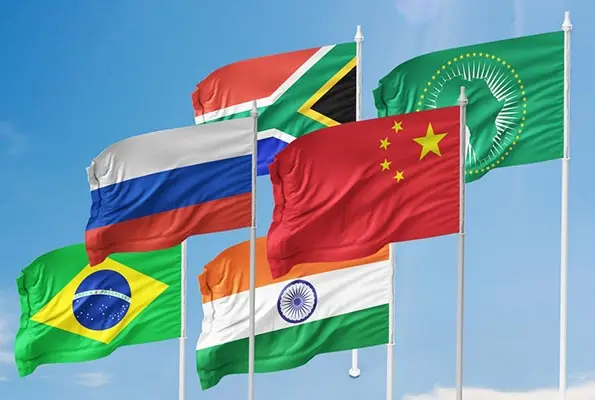The region called MENA (Middle East and North Africa) is not immune to the changing world order; therefore, the BRICS group’s expansion should not be surprising.
Brazil, Russia, India, China, and South Africa make up BRICS, a counterweight to the G7.
Saudi Arabia, Iran, Egypt, and the UAE received four of the six BRICS invites in January 2024 at the summit’s conclusion in South Africa.
By expanding, the group hopes to level a global playing field it sees as ‘unfair’.
On the same day, Brazil President Luiz Inacio Lula da Silva stated the bloc would soon invite additional geopolitical members rather than ideological ones, hinting its MENA selections were also based on might.
Balance Through BRICS
UAE has accepted the bloc’s offer. Analysts expect Iran and Egypt to accept their invites, possibly for financial reasons.
Analysts say Saudi Arabia is still considering the proposal but would likely accept it to balance its relationship with the United States and developing nations like China.
Analysts say the Kingdom’s connection with the United States has frayed on several fronts; joining BRICS would be disintegration, but not the end.
Sami Hamdi, managing director at International Interest, a Middle East political risk firm, told Al Jazeera that Riyadh will first assess Washington’s response and any offers from US President Joe Biden’s delegations before accepting the invitation.
According to Michelle Grise, senior policy researcher at the RAND Corporation, Saudi Arabia, already a regional powerhouse wants to become a global power, which requires stronger connections with China.
Another American ally, the UAE, shares this balanced interest, she noted.
Grise told Al Jazeera that BRICS membership allows Saudi Arabia and the UAE to reconcile their US relations with their commercial interests in China.
Hamdi denied that the pair’s arrival was anti-Western.
“I do not think it means they have become anti-West,” he remarked. Instead, it shows how disillusioned these Western allies are with the West and how they feel it is no longer devoted to their interests and security.
Hamdi noted that the US has made clear its desire to withdraw from the region, encouraging Gulf heavyweights to diversify connections.
“Since the West no longer prioritizes these allies, diversifying relations and pursuing additional poles, blocs, and orbits has become an existential political and economic imperative,” Hamdi said.
New Policies & Partners
Iran, with its already bad relations with many Western countries, has used its BRICS invitation to claim that the US-led international system is disintegrating.
President Ebrahim Raisi told Al Alam that BRICS’ growth proves that the unilateral approach is fading.
Iran has backed BRICS’ dollar-free aspirations. As its economy struggles under US sanctions, American dominance of the global financial system has worried Iran.
According to Grise, Iran joining the union was “a broader trend of Iran seeking to bolster its economic, and military, ties with non-Western powers”.
“I think this is also evidence that Iran is seeking economic partners where it can find them – likely out of necessity given continued sanctions,” she said.
Iran, the UAE, and Saudi Arabia are big oil producers; therefore Hamdi said their entrance “will have major consequences on oil trade and policy”.
“With these additions, BRICS has become a bloc with potentially significant influence on global oil and oil trading financial mechanisms,” he said.
The Regional Differences
Although several nations in the MENA region have improved their bilateral relations, differences have persisted. Analysts say the four MENA countries’ admission muddles bloc cooperation.
“In the last year (2023), we’ve seen the UAE restore its diplomatic relations with Iran, and then a rapprochement between Saudi Arabia and Iran, which has made it possible to imagine a scenario in which all three countries are part of BRICS,” said Grise.
OPEC members Saudi Arabia, the UAE, and Iran have long set aside differences, so Hamdi believes they can do the same in the BRICS bloc.
“Although their differences may complicate decision-making processes, it is unlikely to hinder bloc operations,” Hamdi said.
Ayham Kamel, head of Eurasia Group’s Middle East and North Africa research team, concurred that regional issues are unlikely to be a focus and would be detrimental to a favorable arrangement for the area.
“In one move, the Middle East and North Africa region could have four members in an expanded BRICS organization,” Kamel told Al Jazeera. It will structurally increase their leverage.
Trita Parsi, vice president of the Quincy Institute for Responsible Statecraft, believes a stronger region would advance multipolarity.
He told Al Jazeera, “As the world moves away from unipolarity, the US is also losing its ability to act as a gatekeeper. No one state can any longer decide who is in the Community of Nations and who is a pariah.”



